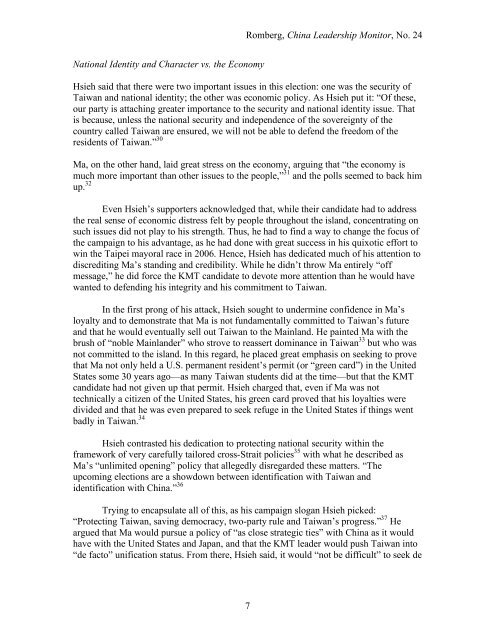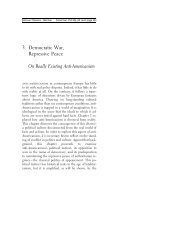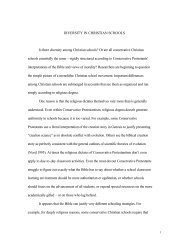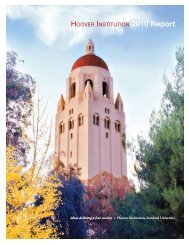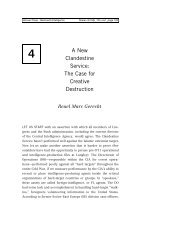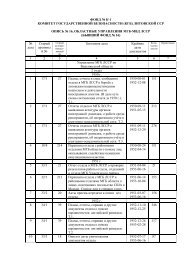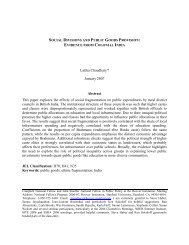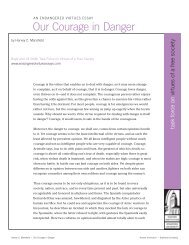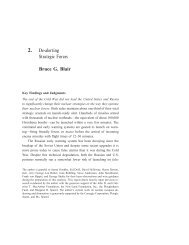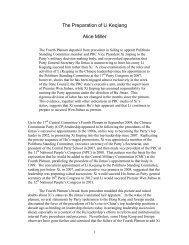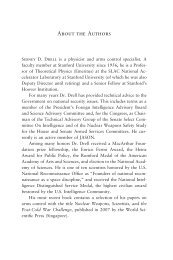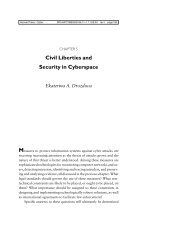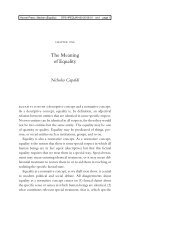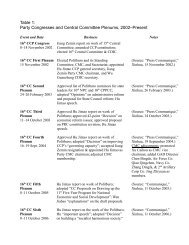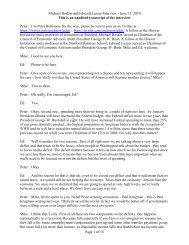Taiwan Elections: Foundation for the Future - Hoover Institution
Taiwan Elections: Foundation for the Future - Hoover Institution
Taiwan Elections: Foundation for the Future - Hoover Institution
Create successful ePaper yourself
Turn your PDF publications into a flip-book with our unique Google optimized e-Paper software.
National Identity and Character vs. <strong>the</strong> Economy<br />
Romberg, China Leadership Monitor, No. 24<br />
Hsieh said that <strong>the</strong>re were two important issues in this election: one was <strong>the</strong> security of<br />
<strong>Taiwan</strong> and national identity; <strong>the</strong> o<strong>the</strong>r was economic policy. As Hsieh put it: “Of <strong>the</strong>se,<br />
our party is attaching greater importance to <strong>the</strong> security and national identity issue. That<br />
is because, unless <strong>the</strong> national security and independence of <strong>the</strong> sovereignty of <strong>the</strong><br />
country called <strong>Taiwan</strong> are ensured, we will not be able to defend <strong>the</strong> freedom of <strong>the</strong><br />
residents of <strong>Taiwan</strong>.” 30<br />
Ma, on <strong>the</strong> o<strong>the</strong>r hand, laid great stress on <strong>the</strong> economy, arguing that “<strong>the</strong> economy is<br />
much more important than o<strong>the</strong>r issues to <strong>the</strong> people,” 31 and <strong>the</strong> polls seemed to back him<br />
up. 32<br />
Even Hsieh’s supporters acknowledged that, while <strong>the</strong>ir candidate had to address<br />
<strong>the</strong> real sense of economic distress felt by people throughout <strong>the</strong> island, concentrating on<br />
such issues did not play to his strength. Thus, he had to find a way to change <strong>the</strong> focus of<br />
<strong>the</strong> campaign to his advantage, as he had done with great success in his quixotic ef<strong>for</strong>t to<br />
win <strong>the</strong> Taipei mayoral race in 2006. Hence, Hsieh has dedicated much of his attention to<br />
discrediting Ma’s standing and credibility. While he didn’t throw Ma entirely “off<br />
message,” he did <strong>for</strong>ce <strong>the</strong> KMT candidate to devote more attention than he would have<br />
wanted to defending his integrity and his commitment to <strong>Taiwan</strong>.<br />
In <strong>the</strong> first prong of his attack, Hsieh sought to undermine confidence in Ma’s<br />
loyalty and to demonstrate that Ma is not fundamentally committed to <strong>Taiwan</strong>’s future<br />
and that he would eventually sell out <strong>Taiwan</strong> to <strong>the</strong> Mainland. He painted Ma with <strong>the</strong><br />
brush of “noble Mainlander” who strove to reassert dominance in <strong>Taiwan</strong> 33 but who was<br />
not committed to <strong>the</strong> island. In this regard, he placed great emphasis on seeking to prove<br />
that Ma not only held a U.S. permanent resident’s permit (or “green card”) in <strong>the</strong> United<br />
States some 30 years ago—as many <strong>Taiwan</strong> students did at <strong>the</strong> time—but that <strong>the</strong> KMT<br />
candidate had not given up that permit. Hsieh charged that, even if Ma was not<br />
technically a citizen of <strong>the</strong> United States, his green card proved that his loyalties were<br />
divided and that he was even prepared to seek refuge in <strong>the</strong> United States if things went<br />
badly in <strong>Taiwan</strong>. 34<br />
Hsieh contrasted his dedication to protecting national security within <strong>the</strong><br />
framework of very carefully tailored cross-Strait policies 35 with what he described as<br />
Ma’s “unlimited opening” policy that allegedly disregarded <strong>the</strong>se matters. “The<br />
upcoming elections are a showdown between identification with <strong>Taiwan</strong> and<br />
identification with China.” 36<br />
Trying to encapsulate all of this, as his campaign slogan Hsieh picked:<br />
“Protecting <strong>Taiwan</strong>, saving democracy, two-party rule and <strong>Taiwan</strong>’s progress.” 37 He<br />
argued that Ma would pursue a policy of “as close strategic ties” with China as it would<br />
have with <strong>the</strong> United States and Japan, and that <strong>the</strong> KMT leader would push <strong>Taiwan</strong> into<br />
“de facto” unification status. From <strong>the</strong>re, Hsieh said, it would “not be difficult” to seek de<br />
7


